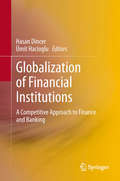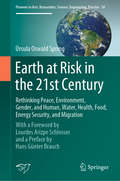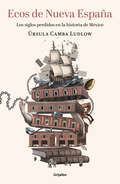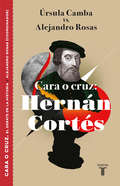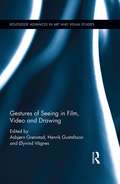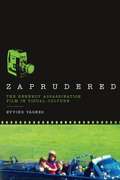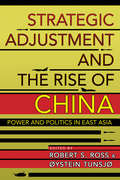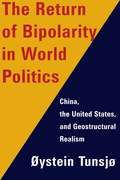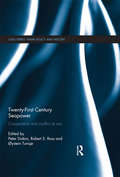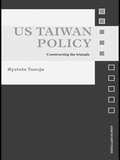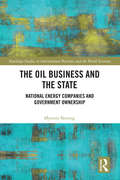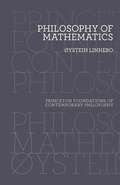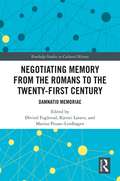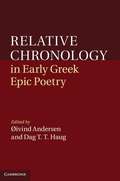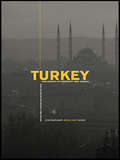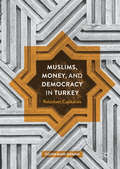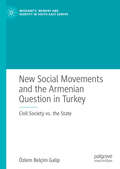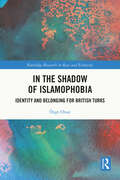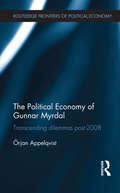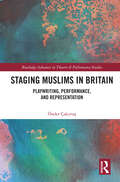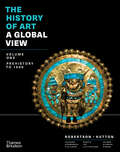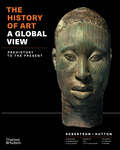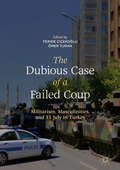- Table View
- List View
Globalization of Financial Institutions
by Hasan Dincer Ümit HaciogluThis peer-reviewed volume from the Society for the Study of Business and Finance, discusses current issues in globalization and financial system from an international political and economic perspective. Contemporary instruments and actors in the global financial system are specially analyzed and the discussion of managerial and financial issues of the global financial strategies offers novelty to readers and researchers in the field.
Earth at Risk in the 21st Century: With a Foreword by Lourdes Arizpe Schlosser and a Preface by Hans Günter Brauch (Pioneers in Arts, Humanities, Science, Engineering, Practice #18)
by Úrsula Oswald SpringEarth at Risk in the 21st Century offers critical interdisciplinary reflections on peace, security, gender relations, migration and the environment, all of which are threatened by climate change, with women and children affected most. Deep-rooted gender discrimination is also a result of the destructive exploitation of natural resources and the pollution of soils, water, biota and air. In the Anthropocene, the management of human society and global resources has become unsustainable and has created multiple conflicts by increasing survival threats primarily for poor people in the Global South. Alternative approaches to peace and security, focusing from bottom-up on an engendered peace with sustainability, may help society and the environment to be managed in the highly fragile natural conditions of a ‘hothouse Earth’. Thus, the book explores systemic alternatives based on indigenous wisdom, gift economy and the economy of solidarity, in which an alternative cosmovision fosters mutual care between humankind and nature.• Special analysis of risks to the survival of humankind in the 21st century.• Interdisciplinary studies on peace, security, gender and environment related to global environmental and climate change.• Critical reflections on gender relations, peace, security, migration and the environment• Systematic analysis of food, water, health, energy security and its nexus.• Alternative proposals from the Global South with indigenous wisdom for saving Mother Earth.
Ecos de Nueva España: Los siglos perdidos en la historia de México
by Úrsula Camba LudlowCasi 300 años de historia se asoman en este original y divertido libro ilustrado que recupera los viajes, lugares, oficios, costumbres y personajes que configuraron el asombroso universo novohispano. Nueva España era un territorio gigantesco, comprendía de lo que ahora es el sur de Estados Unidos hasta Nicaragua. Millones de kilómetros cuadrados. Una vastísima región en la que convivían, no siempre armoniosamente, indígenas, negros, mulatos, mestizos, asiáticos, españoles y uno que otro flamenco, portugués e inglés. Eran piratas, monjas, caciques, virreinas, esclavos y burócratas los que andaban por calles, plazas, y sorteaban los peligros de trasladarse entre pueblos, ciudades y océanos… Contrario a las aburridas lecciones escolares sobre la época virreinal, lejos de los héroes y villanos de monografía, estas páginas nos recuerdan que, entre la llegada de Cortés y la Independencia proclamada por Miguel Hidalgo, existió un mundo complejo y contrastante que apenas se mantuvo en precario equilibrio. Escrito por la reconocida historiadora y escritora, Úrsula Camba Ludlow, Ecos de Nueva España es una apasionante y colorida travesía por los siglos que moldearon nuestro tiempo.
Cara o cruz: Hernán Cortés
by Úrsula Camba Alejandro Rosas¿La Conquista española sólo tuvo como motor principal la ambición desmedida y la obtención de riquezas, o también la conquista espiritual de las almas de los indios? ¿Cómo mezcló Hernán Cortés la política y la guerra en su estrategia? ¿Cómo fue el acercamiento con Moctezuma? ¿Cortés es el gran apestado de la historia nacional o tiene posibilidad de redimirse? A través de estas páginas, la doctora Úrsula Camba y Alejandro Rosas no pretenden sacar del infierno cívico de la historia nacional a Hernán Cortés, tampoco buscan reivindicarlo ni elevarlo a un pedestal como solía hacerlo lahistoria oficial con sus muy cuestionables héroes. Sin prejuicios, ellos se adentran en los años de la Conquista para entender al hombre polifacético, a los protagonistas que participaron junto con él y a las circunstancias de ese acontecimiento histórico del que nació el México actual y que, al mismo tiempo, cambió la historia del mundo.
Gestures of Seeing in Film, Video and Drawing (Routledge Advances in Art and Visual Studies)
by Øyvind Vågnes Asbjørn Grønstad Henrik GustafssonThe first book of its kind, Gestures of Seeing in Film, Video and Drawing engages broadly with the often too neglected yet significant questions of gesture in visual culture. In our turbulent mediasphere where images – as lenses bearing on their own circumstances – are constantly mobilized to enact symbolic forms of warfare and where they get entangled in all kinds of cultural conflicts and controversies, a turn to the gestural life of images seems to promise a particularly pertinent avenue of intellectual inquiry. The complex gestures of the artwork remain an under-explored theoretical topos in contemporary visual culture studies. In visual art, the gestural appears to be that which intervenes between form and content, materiality and meaning. But as a conceptual force it also impinges upon the very process of seeing itself. As a critical and heuristic trope, the gestural galvanizes many of the most pertinent areas of inquiry in contemporary debates and scholarship in visual culture and related disciplines: ethics (images and their values and affects), aesthetics (from visual essentialism to transesthetics and synesthesia), ecology (iconoclastic gestures and spaces of conflict), and epistemology (questions of the archive, memory and documentation). Offering fresh perspectives on many of these areas, Gestures of Seeing in Film, Video and Drawing will be intensely awaited by readers from and across several disciplines, such as anthropology, linguistics, performance, theater, film and visual studies.
Zaprudered: The Kennedy Assassination Film in Visual Culture
by Øyvind VågnesAs the fiftieth anniversary of the Kennedy assassination approaches, the traumatic aspects of the tragedy continue to haunt our perceptions of the 1960s. One reason for this lies in the home movie of the incident filmed by Abraham Zapruder, a bystander who became one of the twentieth century's most important accidental documentarians. <P> The first book devoted exclusively to the topic, Zaprudered traces the journey of the film and its effect on the world's collective imagination. Providing insightful perspective as an observer of American culture, Norwegian media studies scholar Øyvind Vågnes begins by analyzing three narratives that are projections of Zapruder's images: performance group Ant Farm's video The Eternal Frame, Don DeLillo's novel Underworld, and an episode from Seinfeld. Subsequent topics he investigates include Dealey Plaza's Sixth Floor Museum, Zoran Naskovski's installation Death in Dallas, assassin video games, and other artifacts of the ways in which the footage has made a lasting impact on popular culture and the historical imagination. Vågnes also explores the role of other accidental documentarians, such as those who captured scenes of 9/11.
Strategic Adjustment and the Rise of China: Power and Politics in East Asia (Cornell Studies in Security Affairs)
by Robert S. Ross Øystein TunsjøStrategic Adjustment and the Rise of China demonstrates how structural and domestic variables influence how East Asian states adjust their strategy in light of the rise of China, including how China manages its own emerging role as a regional great power. The contributors note that the shifting regional balance of power has fueled escalating tensions in East Asia and suggest that adjustment challenges are exacerbated by the politics of policymaking. International and domestic pressures on policymaking are reflected in maritime territorial disputes and in the broader range of regional security issues created by the rise of China.Adjusting to power shifts and managing a new regional order in the face of inevitable domestic pressure, including nationalism, is a challenging process. Both the United States and China have had to adjust to China's expanded capabilities. China has sought an expanded influence in maritime East Asia; the United States has responded by consolidating its alliances and expanding its naval presence in East Asia. The region's smaller countries have also adjusted to the rise of China. They have sought greater cooperation with China, even as they try to sustain cooperation with the United States. As China continues to rise and challenge the regional security order, the contributors consider whether the region is destined to experience increased conflict and confrontation.ContributorsIan Bowers, Norwegian Defence University College and Norwegian Institute for Defence StudiesDaniel W. Drezner, Tufts University, Brookings Institution, and Washington PostTaylor M. Fravel, Massachusetts Institute of TechnologyBjørn Elias Mikalsen Grønning, Norwegian Defence University College and Norwegian Institute for Defence StudiesChung-in Moon, Yonsei University and Chairman, Presidential Committee on Northeast Asia Cooperation Initiative, Republic of KoreaJames Reilly, University of SydneyRobert S. Ross, Boston College and Harvard UniversityRandall L. Schweller, The Ohio State Universityystein Tunsjø, Norwegian Defence University College and the Norwegian Institute for Defence StudiesWang Dong, Peking University
The Return of Bipolarity in World Politics: China, the United States, and Geostructural Realism
by Øystein TunsjøSince the collapse of the Soviet Union, the international system has been unipolar, centered on the United States. But the rise of China foreshadows a change in the distribution of power. Øystein Tunsjø shows that the international system is moving toward a U.S.-China standoff, bringing us back to bipolarity—a system in which no third power can challenge the top two.The Return of Bipolarity in World Politics surveys the new era of superpowers to argue that the combined effects of the narrowing power gap between China and the United States and the widening power gap between China and any third-ranking power portend a new bipolar system that will differ in crucial ways from that of the last century. Tunsjø expands Kenneth N. Waltz’s structural-realist theory to examine the new bipolarity within the context of geopolitics, which he calls “geostructural realism.” He considers how a new bipolar system will affect balancing and stability in U.S.-China relations, predicting that the new bipolarity will not be as prone to arms races as the previous era’s; that the risk of limited war between the two superpowers is likely to be higher in the coming bipolarity, especially since the two powers are primarily rivals at sea rather than on land; and that the superpowers are likely to be preoccupied with rivalry and conflict in East Asia instead of globally. Tunsjø presents a major challenge to how international relations understands superpowers in the twenty-first century.
Twenty-First Century Seapower: Cooperation and Conflict at Sea (Cass Series: Naval Policy and History)
by Robert S. Ross Peter Dutton Øystein TunsjøThis book offers an assessment of the naval policies of emerging naval powers, and the implications for maritime security relations and the global maritime order. Since the end of the Cold War, China, Japan, India and Russia have begun to challenge the status quo with the acquisition of advanced naval capabilities. The emergence of rising naval powers is a cause for concern, as the potential for great power instability is exacerbated by the multiple maritime territorial disputes among new and established naval powers. This work explores the underlying sources of maritime ambition through an analysis of various historical cases of naval expansionism. It analyses both the sources and dynamics of international naval competition, and looks at the ways in which maritime stability and the widespread benefits of international commerce and maritime resource extraction can be sustained through the twenty-first century. This book will be of much interest to students of naval power, Asian security and politics, strategic studies, security studies and IR in general.
US Taiwan Policy: Constructing the Triangle
by Øystein TunsjøThe relationship between the United States and China is one of the most important issues in the twenty-first century, and is, ultimately, hostage to conditions across the Taiwan Strait. This book is the first to attempt to trace the historical origin of what is known as theTaiwan issue in US-China relations from a constructivist perspective.
The Oil Business and the State: National Energy Companies and Government Ownership (Routledge Studies in International Business and the World Economy)
by Øystein NorengNational oil companies are big business with about 80 percent of the world’s proven oil reserves, and they are crucial to the world’s energy supplies. They are giants, some of the world’s largest companies, measured by market capitalisation, cash flow and investment. Little is known about their modus operandi, how they make decisions about investment and production or about relations with their government-owners. However, it is known that they conduct business with a political mandate, often with multiple long-term objectives, broadly defined and hard to quantify. Unclear mandates give national oil companies leeway to pursue their own distinctive interests, apart from those of the government-owner. As investors, governments are less zealous than private investors. They generally observe multiple objectives, not only return on capital. Therefore, the senior management of national oil companies enjoy more discretionary power and consider longer time horizons than their counterparts in the private sector. The Oil Business and the State explains the practice of state ownership in a capital-intensive industry with high risks and high return, and how these companies act in a market with imperfect competition. This book looks to give readers more insight into the oil industry, into the background of oil exporting countries as well as the economic and political challenges confronting them, including problems of state ownership. The book discusses wider consequences of China replacing the United States as the world’s leading oil importer. It will be of interest to researchers, academics and students in the fields of international business, management history, corporate governance, political economy and economic development of oil-rich countries.
Philosophy of Mathematics (Princeton Foundations of Contemporary Philosophy #15)
by Øystein LinneboA sophisticated, original introduction to the philosophy of mathematics from one of its leading contemporary scholarsMathematics is one of humanity's most successful yet puzzling endeavors. It is a model of precision and objectivity, but appears distinct from the empirical sciences because it seems to deliver nonexperiential knowledge of a nonphysical reality of numbers, sets, and functions. How can these two aspects of mathematics be reconciled? This concise book provides a systematic yet accessible introduction to the field that is trying to answer that question: the philosophy of mathematics.Written by Øystein Linnebo, one of the world's leading scholars on the subject, the book introduces all of the classical approaches to the field, including logicism, formalism, intuitionism, empiricism, and structuralism. It also contains accessible introductions to some more specialized issues, such as mathematical intuition, potential infinity, the iterative conception of sets, and the search for new mathematical axioms. The groundbreaking work of German mathematician and philosopher Gottlob Frege, one of the founders of analytic philosophy, figures prominently throughout the book. Other important thinkers whose work is introduced and discussed include Immanuel Kant, John Stuart Mill, David Hilbert, Kurt Gödel, W. V. Quine, Paul Benacerraf, and Hartry H. Field.Sophisticated but clear and approachable, this is an essential introduction for all students and teachers of philosophy, as well as mathematicians and others who want to understand the foundations of mathematics.
A History of South Sudan
by M. W. Rolandsen Øystein H. DalySouth Sudan is the world's youngest independent country. Established in 2011 after two wars, South Sudan has since reverted to a state of devastating civil strife. This book provides a general history of the new country, from the arrival of Turco-Egyptian explorers in Upper Nile, the turbulence of the Mahdist revolutionary period, the chaos of the 'Scramble for Africa', during which the South was prey to European and African adventurers and empire builders, to the Anglo-Egyptian colonial era. Special attention is paid to the period since Sudanese independence in 1956, when Southern disaffection grew into outright war, from the 1960s to 1972, and from 1983 until the Comprehensive Peace of 2005, and to the transition to South Sudan's independence. The book concludes with coverage of events since then, which since December 2013 have assumed the character of civil war, and with insights into what the future might hold.
Negotiating Memory from the Romans to the Twenty-First Century: Damnatio Memoriae (Routledge Studies in Cultural History)
by Øivind FuglerudManipulation of the past and forced erasure of memories have been global phenomena throughout history, spanning a varied repertoire from the destruction or alteration of architecture, sites, and images, to the banning or imposing of old and new practices. The present volume addresses these questions comparatively across time and geography, and combines a material approach to the study of memory with cross-disciplinary empirical explorations of historical and contemporary cases. This approach positions the volume as a reference-point within several fields of humanities and social sciences. The collection brings together scholars from different fields within humanities and social science to engage with memorialization and damnatio memoriae across disciplines, using examples from their own research. The broad chronological and comparative scope makes the volume relevant for researchers and students of several historical periods and geographic regions.
Relative Chronology in Early Greek Epic Poetry
by Øivind Andersen Dag T. HaugThis book sets out to disentangle the complex chronology of early Greek epic poetry, which includes Homer, Hesiod, hymns and catalogues. The preserved corpus of these texts is characterised by a rather uniform language and many recurring themes, thus making the establishment of chronological priorities a difficult task. The editors have brought together scholars working on these texts from both a linguistic and a literary perspective to address the problem. Some contributions offer statistical analysis of the linguistic material or linguistic analysis of subgenres within epic, others use a neoanalytical approach to the history of epic themes or otherwise seek to track the development and interrelationship of epic contents. All the contributors focus on the implications of their study for the dating of early epic poems relative to each other. Thus the book offers an overview of the current state of discussion.
Turkey: Challenges of Continuity and Change (The Contemporary Middle East)
by Özlem Tür Meliha AltunisikThe authors put issues relevant to Turkey today – such as consolidating democracy, dealing with economic development issues, improving its human rights record and its foreign policy – in an historical context, allowing comparisons with other late developers in the world and reflecting the complexity of Turkish political and socio-economic developments. Turkey also argues that the modernization process that started in the nineteenth century, with all its elements including secularization and Westernization, has taken root.
Muslims, Money, and Democracy in Turkey: Reluctant Capitalists
by Özlem Madi-SismanThis book contextualizes the rise of a neo-Islamic Turkish bourgeoisie class with a particular reference to the relationship between Islam and Capitalism, and makes the argument for their ultimate compatibility . Additionally, the claim is made that the formation of this new socio-economic class has been detrimental to Turkey's efforts to consolidate its democracy. In order to analyze these processes, an Islamic-oriented young business group, Economic Entrepreneurship and Business Ethic Association (IGIAD), was taken as a case study. Drawing on fieldwork in examining IGIAD’S mission, vision, and activities, the book argues that such associations were born as a response to increasing tension between capitalism and Islam, with the aim of creating a ‘moral’ economy within global capitalism.
New Social Movements and the Armenian Question in Turkey: Civil Society vs. the State (Modernity, Memory and Identity in South-East Europe)
by Özlem Belçim GalipThis book explores and comparatively assesses how Armenians as minorities have been represented in modern Turkey from the twentieth century through to the present day, with a particular focus on the period since the first electoral victory of the AKP (Justice and Development Party) in 2002. It examines how social movements led by intellectuals and activists have challenged the Turkish state and called for democratization, and explores key issues related to Armenian identity. Drawing on new social movements theory, this book sheds light on the dynamics of minority identity politics in contemporary Turkey and highlights the importance of political protest.
In the Shadow of Islamophobia: Identity and Belonging for British Turks (Routledge Research in Race and Ethnicity)
by Özge OnayThis book explores the multifaceted experiences of British Turks, particularly focusing on how they navigate and negotiate Islamophobia in contemporary British society. It delves into the complexities of identity, ethnicity, and religion, shedding light on the unique ways in which British Turks respond to and reshape the discourses surrounding Islamophobia. By examining the intersection of Turkish secularism, national identity, and global socio-political dynamics, this book offers a nuanced understanding of how Islamophobia is both experienced and deflected within this community. Through a combination of in-depth interviews, ethnographic insights, and analysis of social discourses, the book highlights how British Turks engage in practices of passing and identity negotiation. It uncovers how these strategies are informed by broader themes such as Brexit, cosmopolitanism, and the legacy of Turkey’s relationship with Europe. This study challenges monolithic interpretations of Islamophobia, presenting a more diverse and intricate portrayal of its impact on different Muslim communities.This book is an essential resource for scholars and students of Sociology, Criminology, Cultural Studies, and Religious Studies, as well as policymakers and practitioners working in multicultural and multi-ethnic contexts. It will be of particular interest to those studying the intersections of race, religion, and identity in the Middle East and Contemporary Europe.
The Political Economy of Gunnar Myrdal: Transcending Dilemmas Post-2008 (Routledge Frontiers of Political Economy)
by Örjan AppelqvistThe intellectual trajectory of Gunnar Myrdal, Swedish Nobel Laureate economist, sociologist, and politician, brings us through many of the major issues in the world economy and politics of the 20th century. This new volume explores Myrdal's work on three major themes: breaking away from conventional assumptions in Political Economy (and highlighting flaws that can still be found in today’s teachings on Political Economy); finding ways of re-creating Europe after WW II, including the discussions between liberal Americans and European social democrats on how to create a more cooperative and socially just international order; and understanding the impact or environmental concerns on growth and development, starting with Myrdal’s participation in the first UN Conference on Environment in Stockholm 1960 and continuing with his later writings. What is then the relevance of these themes today? In times when financial crisis threatens to block international and domestic economies, when the European Union’s promises of prosperity and cooperation seems to be severely threatened and when there is a large consensus that current modes of economic development are ecologically unsustainable: can we find ways of transcending seemingly intractable dilemmas? These questions will be discussed in the final part of the book.
Staging Muslims in Britain: Playwriting, Performance, and Representation (Routledge Advances in Theatre & Performance Studies)
by Önder ÇakırtaşThis scholarly volume delves into the manner in which British Muslims articulate their cultural, social and religious identities through theatrical productions in 21st-century Britain and examines their portrayal within these performances.The study investigates the factors influencing the emergence and evolution of Islamic theatre in Britain, providing an in-depth analysis of plays by British playwrights of both Muslim and non-Muslim origins that have shaped the trajectory of British Islamic theatre from the late 20th century to the present. Önder Çakırtaş critically examines how British playwrights, predominantly of Muslim origin but also including some of non-Muslim origin, depict Muslim identity and culture from their unique perspectives, particularly in the context of post-9/11 society. Adopting a comprehensive approach to Islamic playwriting and performance, this book highlights the accomplishments and contributions of contemporary British playwrights, primarily from Muslim backgrounds.This study will be of significant interest to scholars and students in theatre studies, as well as related disciplines such as Islamic studies, sociology and political science.
The History of Art (Vol. Volume 1): Prehistory To 1500
by Rex Koontz Jean Robertson Ömür Harmansah Stacey Sloboda Deborah Hutton Cynthia Colburn Eric Kjellgren De-nin Lee Henry Luttikhuizen Allison Lee Palmer Monica Blackmun VisonàA more global, flexible way to teach art history The History of Art: A Global View is the first major art history survey textbook -- written by a team of expert authors -- with a global narrative in mind. A chronological organization and “Seeing Connections” features help readers make cross-cultural comparisons, while brief, modular chapters (with on-page definitions) offer instructors unparalleled flexibility. You can assign more than one chapter per week for a fully global course, or skip and reorder chapters, for a more focused syllabus.
The History of Art: A Global View: Prehistory to the Present (Vol. Combined Volume)
by Rex Koontz Jean Robertson Ömür Harmansah Stacey Sloboda Deborah Hutton Cynthia Colburn Eric Kjellgren De-nin Lee Henry Luttikhuizen Allison Lee Palmer Monica Blackmun VisonàA more global, flexible way to teach art history The History of Art: A Global View is the first major art history survey textbook -- written by a team of expert authors -- with a global narrative in mind. A chronological organization and “Seeing Connections” features help readers make cross-cultural comparisons, while brief, modular chapters (with on-page definitions) offer instructors unparalleled flexibility. You can assign more than one chapter per week for a fully global course, or skip and reorder chapters, for a more focused syllabus.
Cities and the Shaping of Memory in the Ancient Near East
by Ömür HarmanahThis book investigates the founding and building of cities in the ancient Near East. The creation of new cities was imagined as an ideological project or a divine intervention in the political narratives and mythologies of Near Eastern cultures, often masking the complex processes behind the social production of urban space. During the Early Iron Age (ca. 1200-850 BCE), Assyrian and Syro-Hittite rulers developed a highly performative official discourse that revolved around constructing cities, cultivating landscapes, building watercourses, erecting monuments, and initiating public festivals. This volume combs through archaeological, epigraphic, visual, architectural, and environmental evidence to tell the story of a region from the perspective of its spatial practices, landscape history, and architectural technologies. It argues that the cultural processes of the making of urban spaces shape collective memory and identity as well as sites of political performance and state spectacle.
The Dubious Case of a Failed Coup: Militarism, Masculinities, and 15 July in Turkey
by Feride Çiçekoğlu Ömer TuranThis volume is an attempt to contextualise the coup attempt of 15 July 2016 in Turkey, within the framework of militarism and masculinities. The immediate aftermath of the 15 July in Turkey witnessed confusion, contestation and negotiation among different narratives, until a hegemonic version was superimposed on the collective memory as part of official history building. This project is an attempt to bring a fresh and critical perspective by compiling together analyses from various disciplines of political science, media and film studies, literature, sociology and cultural studies. Several chapters of this volume delineate the paradox of “victorious militarism,” meaning that despite the failure of the coup, its aftermath has been shaped by a new wave of state-sponsored gendered militarism, with the establishment of a regime of “state of emergency.”
